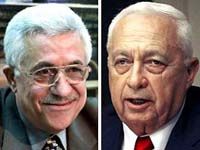APN President & CEO Debra DeLee's OpEd about the upcoming Sharon-Abbas summit which appeared in Israel's YNETnews

http://www.ynetnews.com/articles/0,7340,L-3098100,00.html
June 10, 2005
Palestinian President Mahmoud Abbas' recent hospitalization for a heart problem should be a reminder that the June 21st summit between him and Israeli Prime Minister Ariel Sharon needs to produce more than just a nice photo-op. Questions about Abbas' physical (and political) health underscore the fact that the opportunity for Israel to deal with this pragmatic Palestinian leader will not last forever-just as Palestinians must recognize that Sharon's grip on power will be challenged when Israel's evacuation of settlements begins in August. Therefore, Sharon and Abbas need to come away from their summit with a set of understandings that will strengthen each of them.
Both leaders have an interest in seeing that Israel's pullout from Gaza and the northern West Bank goes smoothly. To this end, a formal security coordination system must be established at the national and local levels to identify potential problems. U.S. security envoy Gen. William Ward should be part of this system to help the two sides work through crises that could unfold.
For example, how will Israelis and Palestinians prevent or react to rocket attacks on Israeli communities while the withdrawal is taking place? What about terrorist assaults on settlers and security forces engaged in evacuation? What will be the response to settler attacks on Palestinians in the occupied territories? How will they respond if right-wing Israelis make good on their threat to march through Palestinian communities in Gaza in order to reach settlements in the Strip?
Beyond coordinating responses, Sharon needs to allow Palestinian security services-with U.S. oversight-to acquire the tools they need to fight terrorists, as Israel demands. The Palestinian Authority (PA) is recruiting thousands of new security officers to help provide calm during the evacuation, but it lacks the guns and other hardware to seriously go after armed members of Hamas and Islamic Jihad. Israel should let the PA take delivery of armored vehicles recently offered by Russia, allow it to acquire more rifles and communications equipment, and expedite the background checks of Palestinians chosen to receive better security training in Egypt.
Simultaneously, Abbas needs to do more to address legitimate Israeli concerns about his approach to dealing with terrorists. In exchange for Israel's agreement to give him more time to co-opt militant groups into the political system, he should commit to forcefully confront those Palestinian extremists who refuse to lay down their arms. An Israeli-Palestinian-American committee should also be set up to monitor whether or not Palestinians on Israel's list of wanted men actually forego terrorism and disarm.
Abbas also can enhance his credibility with Israel by building on his earlier decision to ban incitement from official Palestinian media. He should offer to allow a neutral third party to monitor the two sides for statements or actions designed to arouse their own populations to violence against the other and to serve as a source of binding arbitration for complaints about incitement.
Other understandings need to be reached to improve the economy in the occupied territories after the evacuation.
While Israel has removed some roadblocks in the West Bank, other checkpoints and roadblocks remain that hinder the passage of goods and people between Palestinian cities. An Israeli-Palestinian-American panel should be established to review the military necessity of each of these measures in order to determine which can be removed without putting Israeli security at risk.
Israel has made some interesting proposals for constructing high-tech crossing terminals along the Green Line, as well as building rail links between an Israeli port and the territories to improve the flow of goods. Israel has also proposed to build a rail line between the West Bank and Gaza that could serve as a safe passage route and to let the Palestinians construct a new seaport in Gaza. A commission should be set up to coordinate how these ideas can be expedited.
Finally, although Sharon is not enthusiastic about entering into peace negotiations with the Palestinians, he needs to give Abbas some sort of political horizon for a future Palestinian state in order to let him show his people that the path of non-violence can lead to progress. Sharon should offer to convene a meeting with the Palestinians, the Quartet, and other interested parties to review the status of compliance with the Road Map after the settlement withdrawal and future Palestinian legislative elections are complete. Such a session could point the way to diplomatic developments without committing Israel to entering into final status talks for the time being.
If Sharon and Abbas take advantage of their upcoming summit to strengthen each other in the ways outlined above, they will be in better shape to do the heavy political lifting that awaits them later this summer.
Debra DeLee is President and CEO of Americans for Peace Now.